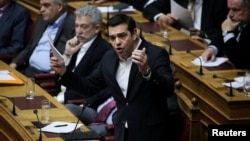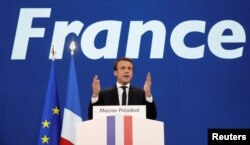The Italian and Greek governments are counting on France's likely next president Emmanuel Macron to help them see off populist parties that blame European Union-enforced austerity and open immigration policies for economic and social ills.
Greek prime minister Alexis Tsipras and Italian premier Paolo Gentiloni both called Macron on Monday to congratulate him after the independent centrist won Sunday's first round of voting in the French election.
The former economy minister, who is seen in southern Europe as an opponent of rigid austerity, is favored to defeat far-right, anti-EU candidate Marine Le Pen in the May 7 run-off.
Five Star Movement a concern
The ruling parties in heavily indebted Italy and Greece hope his enthusiasm for the EU will help them see off challengers such as Italy's Five Star Movement, which wants a referendum on ditching the shared euro currency.
A Greek official said Tsipras and Macron had an amicable discussion in which Macron noted his previous support for Athens in tough bailout talks with EU powers.
“I supported the need for a change of stance towards Greece,” the official quoted Macron as telling Tsipras. “It is certain that if I'm elected we will work closely together to ensure that Europe meets the needs of our generation.”
Gentiloni also spoke to Macron, an Italian official said, adding that the two would work together to ensure Europe can face its economic challenges.
Former Italian prime minister Matteo Renzi, who is plotting a path back to power at elections due next year, also welcomed Macron's first-round victory, saying he represented a Europe that looked to the future, not “to the decimal points.”
Italian European Affairs Minister Sandro Gozi told Reuters a Macron presidency would bolster the ruling Democratic Party (DP) against populist forces like Five Star, which opinion polls show rivaling the DP with as much as a third of the vote. A path to government remains difficult, however, given its refusal to consider alliances and Italy's electoral system.
Le Pen's plans
Five Star and the right-wing Northern League question to varying degrees the adoption of EU open-immigration policies, the cornerstone of which is the Schengen open-borders area.
“Macron's first round win and his likely victory in the second round will help give us a push,” Gozi said.
“Le Pen wants to get out of the eurozone, to get out of NATO, to dismantle Schengen and basically do many things that either the Northern League or Five Star want to do here. So if Macron wins, it is excellent news for us.”
The French connection
For Greece, a Le Pen victory would knock its major EU ally out of the union and weaken its defenses against a push from Germany, the bloc's biggest creditor, for continued austerity.
Greece has debts equal to 178 percent of its economy and is struggling to conclude a progress review on reforms prescribed by its international lenders in exchange for vital loans.
Outgoing French President Francois Hollande helped fellow leftist Tsipras seal a 86 billion euro ($93 billion) bailout from the EU in July 2015, its third since 2010, which kept the crisis-hit country in the eurozone.
It expires next year, however, and Athens now needs France to lobby the rest of the EU, especially Germany, to agree to debt relief. Tsipras is counting on this support as the next election approaches in 2019.
Markets react to results
“Relations between Greece and France are strategic, they are based on mutual interests and common views on European affairs and I believe that Macron would stick to Hollande's policy, which was supportive on Greece,” deputy foreign minister George Katrougalos told Reuters.
A senior Greek government official close to the bailout talks, which resume this week in Athens, agreed that a Macron presidency would be “sympathetic and supportive” of Greece.
Markets in Greece and Italy also welcomed the prospect of a Macron victory next month. Greek 10-year government bond yields hit a two-and-a-half-year low and Italian yields sank despite a credit rating downgrade on Friday.








